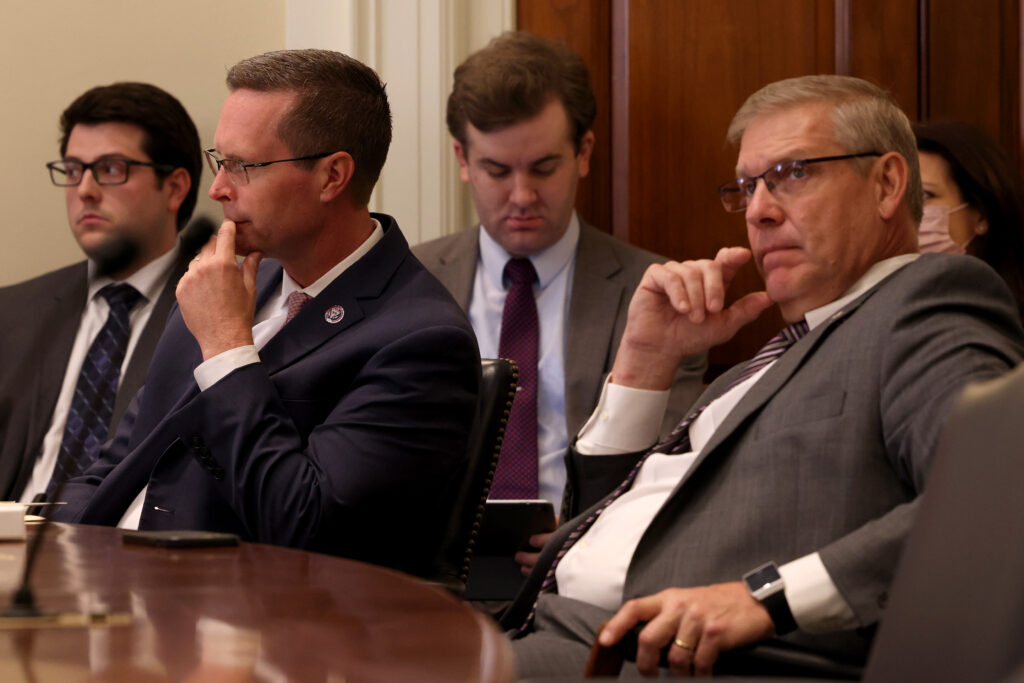Rep. Barry Loudermilk, R-Ga., pictured in a file photo, said state constitutions serve as a check against state legislatures when it comes to voting rights. Photo by Anna Moneymaker/Getty Images..
WASHINGTON — Legal experts on Thursday warned lawmakers on the U.S. House Administration Committee that if the U.S. Supreme Court upholds a North Carolina case that embraces a fringe election theory, it would undermine future elections across the country.
“To be blunt, it would be extraordinary destabilizing,” said Carolyn Shapiro, a law professor at the Chicago-Kent College of Law.
The committee held the hearing in response to concerns that the Supreme Court could uphold the so-called state legislature theory, which argues that the Constitution gives legislatures the ability to regulate federal elections without oversight from state courts.
Conservative activists have pushed the theory, most notably after the 2020 presidential election, when then-President Donald Trump used the theory to try to overturn election results, said Eliza Sweren-Becker of the Brennan Center for Justice, which is a liberal nonprofit law and public policy institute.
If the Supreme Court embraces the theory, she said state legislatures could approve partisan gerrymandering, remove constraints on voter suppression tactics and enact different policies for state and federal elections, causing chaos for voters.
Sweren-Becker said that if the Supreme Court upholds the case, the consequences would stretch beyond North Carolina and “wreak havoc on election nationwide.”
“All this would undermine the public’s already wavering faith in our democracy,” Sweren-Becker said.
She said that federal law would prohibit state legislatures from overturning the results of the election, and that the claim is “not a license to coup.”
“But the notion would open the door to anti-democratic shenanigans and even failed efforts to manipulate our elections, erode trust and ultimately participation in our democracy,” she said.
North Carolina maps
The court will hear the case, Moore v. Harper, next term. The case is about the newly drawn maps for North Carolina’s 14 congressional seats. The North Carolina Supreme Court found the maps violated the state’s constitution because of gerrymandering.
State Republicans argue that the U.S. Constitution’s Elections Clause gives state legislatures the ability to define congressional districts without the checks and balances of the state constitutions or courts.
The ranking member on the U.S. House panel, Rep. Rodney Davis, an Illinois Republican, said that it was a complicated theory and accused Democrats of “suggesting this theory is all a grand plan by Republicans to steal the (2024) election,” and “use this theory as a ‘doomsday type scenario’ to fundraise.”
Rep. Barry Loudermilk, a Georgia Republican, said there are still restraints on state legislatures and that he believed they should not be allowed to overrule their own constitutions.
“I don’t want us to jump to conclusions that the Supreme Court would embrace an extreme version of this,” he said.
Rep. G.K. Butterfield, a North Carolina Democrat, asked NYU constitutional law professor Richard Pildes if lawmakers were overreacting in their concern about the Supreme Court upholding the North Carolina case.
If the Supreme Court upheld parts of the theory, it “would have extremely destabilizing consequences,” Pildes said. “Most of them would have significantly destabilizing consequences, and there are a lot of legal uncertainties that would be unleashed under any version of this doctrine.”
Rep. Bryan Steil, a Wisconsin Republican, asked Sweren-Becker if voters provided a type of checks and balances on state legislatures.
“Yes, absolutely,” she said. “And that’s why it’s so concerning that this notion could remove the power of voters to enact laws through direct democracy.”
The post Experts warn of election ‘havoc’ across the U.S. if North Carolina case succeeds appeared first on Minnesota Reformer.
